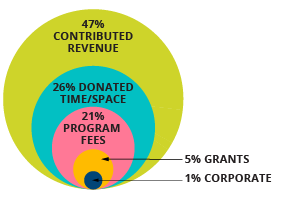Annual Report 2019
To view a PDF version of this 2019 Annual Report, please click here.
Table of Contents
2019 was a pivotal year at PEPS that followed several years of internal work and investment in improving our policies, practices, programming, and curriculum, and making a commitment to racial equity. We also reached out to the community, conducting an organizational assessment, gathering input from parents and organizations in the community to learn about how we can better show up for families.
Building on everything we learned, we moved into action and developed a new mission, vision and values, along with a bold new strategic direction. This critical work, done by our dedicated board of directors and passionate staff in 2019, built the foundation for new initiatives that will become part of who we are over the next decade.
While we re-imagined the future, we connected more than 4,000 parents in 2019. Social connection is the heart of what we do and always will be. We know that when we strengthen our connection with one another, we are healthier, more resilient, and more fulfilled.
We could not have done this without the help of our committed board members and staff, generous community of volunteers, donors, funders, sponsors, and in partnership with community-based organizations. You can learn more about this inspiring work below.
I am beyond grateful for your tremendous investment in families in our areas. Thank you!
In community,

Dana Guy
Executive Director, PEPS
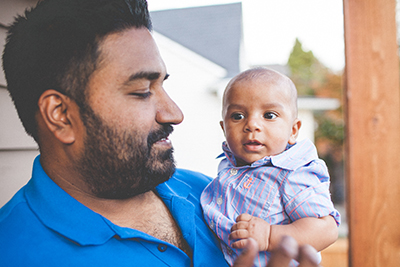 Connecting Parents
Connecting Parents
At PEPS, we are convinced that social connection is a basic need and we are fiercely committed to standing by parents in the most transformative time of their lives. We strive to uplift families by providing support and connection to combat loneliness and build confidence as a new parent. We are engaging in ongoing work to make PEPS programs more accessible and inclusive. We have taken action by conducting an anti-bias review of our curriculum, offering a range of program fee choices, offering Spanish-language groups with our community-based partners and more.
PEPS programs are continually evolving, and we will continue to embrace listening, learning, and finding new ways of doing things – all guided by our goals and values.
|
|
|
“…being a parent was an area where I didn't have community. That is the environment, that is the culture of PEPS, is that you're supportive and you hold one another. Community is essential to have, but also to be a part of, to contribute to. I can't imagine being a parent or going through this process without PEPS.” – Ari R., PEPS Group Participant
[Top]
Strengthening Families
Our programs are rooted in the research-based Strengthening Families framework. This framework establishes five protective factors (pillars of support) that are critical to family well-being, which in turn supports parent-child attachment and parental resilience.
Within each PEPS group, we conduct pre- and post-group surveys to assess participant satisfaction, participants' changes in the five protective factors over time, the impact of PEPS, areas for improvement in our curriculum, leader trainings, and so much more. Annually, these results are compiled into our Outcomes Report.
More than 80% of parents surveyed in 2019 agree that PEPS helped them understand child development, learn about postpartum mood disorders, normalize mixed feelings, spend enjoyable time with their baby, and meet other parents to relate to.
Five Protective Factors
Child development support • Social support • Emotional support • Parenting support • Informational support
PEPS Parents experienced increases in all 5 critical areas of support:
 |
 |
 |
 |
 |
"Just like the secure base babies need to feel safe enough to learn and grow, parents greatly benefit from a secure base of support as they navigate the joy and discomfort of becoming a parent. The sense of connection and belonging new parents can find in a PEPS group provides a network of support during this major life transition. When we know that we are not alone, and when we connect and learn with others, we can find greater resilience through the ever-changing journey of parenting.” – Sarina Behar Natkin, LICSW Parent Coach, Speaker, and Author
[Top]
Engaging Our Community
Volunteers are an extraordinary part of the PEPS community and a reason our programs are so effective and meaningful.
81% of PEPS groups are facilitated by our trained volunteers. Our Group Leaders are passionate and committed to supporting new parents by cultivating a culture of belonging and inclusion to effectively build community and connection. We offered two additional training sessions for Leaders to help them build advanced facilitation skills in leading deeper and more meaningful conversations on mindfulness, race, and social identity.
Volunteers also elected to assist at events like our Luncheon and within our office. Additionally, more than 60 knowledgeable professionals volunteered as Guest Speakers in 2019. These speakers shared their expertise by joining PEPS Groups, presenting on topics such as couples’ relationships, estate planning, infant safety and CPR, and many more.
|
|
|
“Volunteering for PEPS is an easy choice…The joy I feel can’t be matched as I see moms and dads gain confidence and build lasting peer relationships. I know my time is making a difference because I see it firsthand and when I hear a group has continued past 12 weeks, that's just icing on the cake. PEPS has given so much to my family and the greater Seattle community, it feels wonderful to stay connected and give back.” – Stephanie S., PEPS Group Leader
[Top]

- Families and facilitators participating in the Mercy Housing Northwest and PEPS partnership group

- Families participating in the Open Arms and PEPS partnership group
Partnering with Community-Based Organizations


For the past several years, we have been listening and learning how we can improve, adapt, and redesign our PEPS parent peer-support model to be increasingly responsive to the needs of the parents. As part of our response, PEPS has cultivated meaningful partnerships with community-based organizations, both locally and nationally.
In 2019, PEPS collaborated with a total of 5 community-based organizations within Washington State, investing PEPS resources and staff to train team members of partner organizations on the PEPS model and curriculum. We offered Spanish-language groups in partnership with one of our new partners, Mercy Housing Northwest, as well as with Open Arms Perinatal Services, to serve 45 Spanish-speaking mothers from lower-income households. PEPS also built a new partnership with Southwest Youth and Family Services, piloting a site-based, Spanish-language peer-support group for 6 new and expectant teen parents. Learn more about these local partnerships with community-based organizations here.
Additionally, PEPS supported 5 out-of-state and 4 local partners through our Network Partners program. This program gives other nonprofit organizations the ability to use the PEPS model, through licensing, to offer peer-support groups to their specific community, affinity, or geographic region. Together, these nine organizations served 750 parents in 2019. Learn more about these partnerships with Network Partners here.
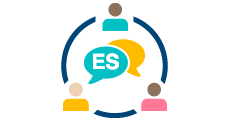 45 parents
|
|
|
“The PEPS Network was instrumental in the launch of PIP programming in Austin. Not only did the PEPS Network help us establish the curriculum for our programming, the amazing staff has provided consultation and support that enabled us to secure funding for the next three years. The PEPS Network has been essential in our efforts to reach new parents in Austin, and we are looking forward to many years of continued success and collaboration.” – Krista Miller, Co-Founder, Partners in Parenting
[Top]
Decreasing Barriers to Access
Through a series of community engagement efforts in 2019, PEPS conducted an organizational assessment to gather input from parents and organizations in the community to learn about how we can better show up for families in our region. Parents shared with us the biggest barriers to PEPS – including that we hosted many of our groups in homes, the program fee, and that we offered English-only groups.
We took swift and thoughtful action to break down those barriers. We started with an examination of the in-home model of our PEPS groups gatherings and introduced groups that met weekly in community spaces throughout our regions instead, starting with Newborn groups.
We addressed the financial barriers by refining our Flexible Pricing program fee model, which we piloted in 2018 and rolled out for all groups in July 2019. This equitable model offers parents participating in all PEPS groups a choice of four different program fee options, which families select based on what works best for their family, making our parent peer-support groups more financially accessible.
Following a more in-depth program evaluation, we began translating our curriculum into Spanish and expanded partnerships with local organizations to offer Spanish-language groups. We also began offering our group facilitation trainings in Spanish.
|
|
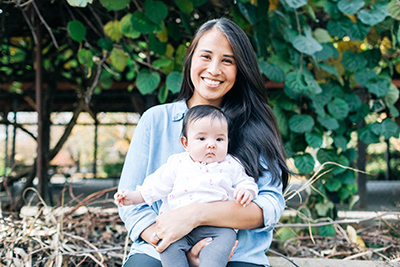 |
“…it is really a wonderful gesture to offer flexible pricing. My family is in a very different financial position with our second baby than we were with the first, and I truly appreciate being able to participate in PEPS again without worrying whether we can afford it. Many thanks!” – PEPS Group Participant
[Top]
Moving Forward
Our country is in the midst of a long-overdue racial reckoning. At PEPS, we stand in solidarity with the Black community in calling for justice and accountability. We acknowledge that we have been complicit to systemic racism and that it should never have taken so long for PEPS and our country to wake up to the systemic racial injustices Black people are subject to in our community and across the country every day.
We are committed to a path forward with more action. We will continue to examine, identify, and interrupt the ways white supremacy is showing up in our programming and organization. We will ensure every parent who participates in a PEPS group has tools and resources to support them in raising anti-racist children. We commit to having conversations about race and social identity in PEPS groups. We will better prepare our Group Leaders to facilitate these conversations with courage.
In 2019, PEPS developed a new Strategic Direction. Over the next five years, our organization, staff, and board will be taking bold action. Our priority is to ensure our programs are inclusive and accessible. We will listen, learn, innovate, and work in partnership with other community-based organizations to offer multiple opportunities for parents to engage and connect. We will continue to invest in building an effective and supportive organizational culture, while operating with an equity lens. And we won’t stay silent or neutral anymore – we will use our power and voice to advocate for parents and families in our region who are facing the most disparities.
Grow the PEPS Reach |
Advocate for Equitable Policies |
Innovate Our Approach to Parent Support |
Strengthen Organizational Effectiveness |
[Top]
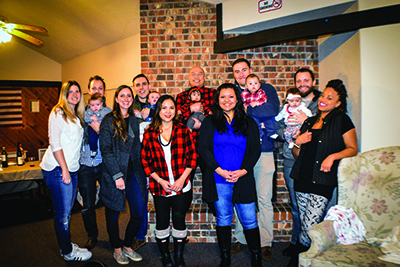 Your Investment at Work
Your Investment at Work
PEPS has been able to support parents and their families because our work has been fueled by our giving community - by those who so generously invest their financial resources, their time, and their expertise because they believe in the importance of our mission. We are grateful to our donors, funders, sponsors, and volunteers who so thoughtfully show their support for our work through gifts and time volunteered.
Revenues $2,050,800 |
Expenses $2,198,703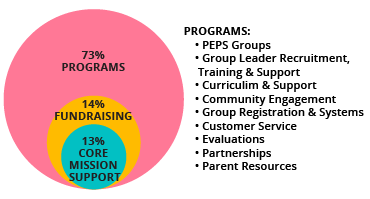 |
Net assets as of December 31, 2019: $1,636,984
PEPS strongly believes in investing in our staff, systems, and infrastructure to build a work environment that is conducive to the growth, well-being, and development of our employees and volunteers. This ultimately results in stronger programs, the ability to expand our programs and services to other parenting stages, and a greater impact for the parents we serve. Our operations and fundraising are fundamental to delivering our programs to families.
For more details on our financial resources, please view our 2019 Financial Statement.
“The community we formed through our evening parents group was really important to both Mike and I. The reason I decided to financially support PEPS, however, was around the concept that dollars spent on early parenting and early intervention consistently show very high benefit. I am really mostly spending money supporting PEPS because I believe in the idea of using what has worked and trying to change/adapt/use that learning to work with other communities to support a diversity of parents. I think finding ways to build communities for parents is super important.” – Beth D., 2019 Donor
[Top]
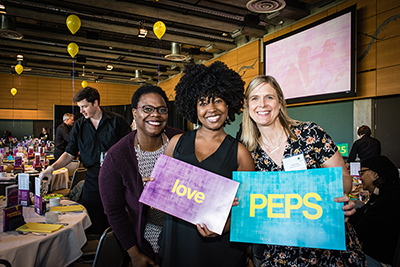 Join Us!
Join Us!
Our work of supporting new families is possible in large part thanks to those who generously invest their time, financial resources, and expertise. Are you interested in contributing to strengthen families and build community? Get involved today!
|
Lead
|
Invest
|
Share your expertise
|
|
|
Lend your skills
|
Sign up
|
[Top]
2019 PEPS Board of Directors and Staff
Thank you to all of our enthusiastic and committed board and staff!
2019 Board of Directors
Sarah Cody Roth, Vice President
Mary Ellen Cunningham, President
Tracy Cutchlow
Shanna Donhauser, Secretary
Chrissy Egan, Treasurer
Jamie Elzea
Suzanna Fix (part year)
Lesley Graham
Tera Holman (part year)
Rue Khosa (part year)
Rebecca Koladycz (part year)
Caroline Koplowitz
Debbie LeeKeenan (part year)
Julianna Rigg Hillard (part year)
Beth Trakimas (part year)
Chezik Tsunoda (part year)
Vidya Vasu Devan
Leslie Wander
Dave Wilson (part year)
Kathryn Zetzer (part year)
2019 PEPS Staff
Patricia Andre-Edgar, Communications and Marketing Director
Swarnima Aswinkumar, Leader Impact Specialist
Zoe Barker-Aderem, Donor Relations Manager (part year)
Jessica Brockman, Development Manager (part year)
Kintea Bryant Rossiter, Program Director
Jennie Capron, Community Connector – Northern Region
Michelle Geller, Finance and Administrative Coordinator
Maria Alejandra Gomez, Community Connector – Eastern Region
Dana Guy, Executive Director
Polly Jirkovsky, Community Connector Southern Region
Marion Mohrlok, Development Director
Cari Morales, Operations Director
Christina Phelps Shaw, Data Specialist
Allanah Raas-Bergquist, Operations Coordinator
[Top]
Document Actions







